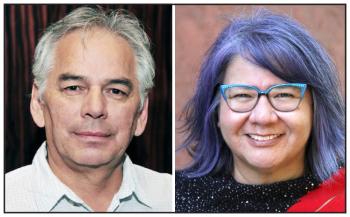Image Caption
Summary
Local Journalism Initiative Reporter
Windspeaker.com
Economic strength and wealth comes from the land, said First Nations leaders last week at the Grand Economic Circle of Indigenous Peoples and Quebec.
“I have to reiterate our determination to have our rights and our ancestral territories and our government autonomy respected,” said Assembly of First Nations Quebec and Labrador (AFNQL) Chief Ghislain Picard.
“Economic wealth and prosperity … That is tied to the land,” said Assembly of First Nations National Chief RoseAnne Archibald. “So the land that we stand on today is the basis for all the wealth in this province and all the wealth in this country, and the people who are the rightful caretakers of that land are First Nations. So unceded land means that it’s important that First Nations have access to the wealth of their land.”
On Nov. 25 and 26, chiefs, Indigenous entrepreneurs, business leaders and Quebec elected officials gathered in Montreal, the unceded territory of the Kanien’kehá:ka Nation. The Grand Economic Circle was a joint venture between the AFNQL and the provincial government to discuss economics and better inclusion of Indigenous peoples.
“Economics is a subject which is very important to us. The premier, in his opening speech, mentioned that First Nations should be part of this economic comeback,” said Indigenous Affairs Minister Ian Lafrenière. He urged participants to work together and network to find economic solutions.
Premier Francois Legault, who delivered his speech at the start of the new parliamentary session of the Quebec National Assembly on Oct. 19, addressed First Nations, saying they work as partners in a nation-to-nation dialogue.
Panels lead by chiefs at the economic circle made clear that reconciliation was only possible when economic development in the province of Quebec moved forward in full and equal partnership with Indigenous communities.
Full partnership includes Indigenous communities being consulted prior to any development being undertaken; development contracts with Indigenous communities being normal and not the exception; Indigenous representation on corporate boards and within governments; and training adapted to meet Indigenous needs, said Chief Monik Kistabish of the Abitibiwinni First Nation.
“(The government must) have the true desire to reduce the socio-economic gap,” said Kistabish.
That will only come, he said, when the Quebec government stops exploiting the land, and development industries, such as mining, sign impact benefit agreements with First Nations before new projects received permission or extensions were granted.
Chiefs also said that economic development had to be informed by First Nations values.
“Too often when looking at economic development (it’s) as an issue of amassing wealth, amassing gain, and I think that perspective has to be readjusted to more of a First Nations’ approach where it’s more wholistic. You do have to take into consideration the impacts we have on the environment and how resources are exploited,” said Chief John Martin of the Micmacs of Gesgapegiag.
“In 2021 with an approach whereby First Nations represent … an added value to the economic development of our regions across Quebec, I believe that government must add their capacity and their level of cooperation to working with First Nations,” said Chief Gilbert Dominique of Pekuakamiulnuasht Takuhikan.
“We are not against economic development. We want to be a part, a stakeholder in economic development, taking into account our aspirations, our values, our challenges,” said Dominique.
He stressed that First Nations were not lobbying groups but decision-makers, and only when the Quebec government realized that would there be a “win-win situation for the future of our First Nations.”
Martin also pointed out that when First Nations benefitted so did the communities surrounding them.
Archibald, who participated in a panel of women leaders, said it was important that development agreements were sustainable and that seven generations forward was the benchmark for sustainability.
“These agreements that we’re reaching between First Nations and business partners have to balance the ideas of developing a resource and developing an economy with also protecting the land. So we have to do two things at once. I know sometimes people feel that these two things are at odds but they're not. We can hold two contradictory ideas in one space,” said Archibald.
She criticized the way planning is being done now. She said with Indian Act band elections happening every two years, custom band elections every three to four years, and provincial and federal government elections every four years, thinking and planning has been limited to those time-frames.
Building something substantial means planning for seven generations ahead–175 years–which ensures that development does not involve eliminating resources, but involves developing a future for youth, stressed Archibald.
“I think that's part of the way forward. If people were to look at us, whether it's business partners or potential government partners in development in the future, that's the vision that we bring in having environmental stewardship and environmental responsibility in projects,” said Grand Chief Kahsennehawe Sky-Deer of the Mohawk Council of Kahnawa:ke.
Capacity building of youth, environmental health and preservation of culture vitality are all important, said Grand Chief Mandy Gull-Masty of the Grand Council of the Crees.
Industries have an advantage, she said, when they can ensure “social acceptability.”
It’s a balancing act, she said, to deliver jobs for youth and to ensure members can still hunt, trap and fish in their traditional territory. When industry can deliver on this it provides an opportunity for industry to steer government in creating new policy, new mechanisms, and new procedures, said Gull-Masty.
On the final day of the conference, Lafrenière announced a $3.3 million investment by his government for a hotel project in Kahnawa:ke.
The federal government also coincided its announcement of the renewal of two key strategic partnership initiatives with the conference. True North Treasure Initiative and the Forest Full Value Initiatives will each receive $4.5 million. Both contribute to the economic self-sufficiency of Indigenous communities in Quebec, said Indigenous Services Minister Patty Hajdu.
Local Journalism Initiative Reporters are supported by a financial contribution made by the Government of Canada.

